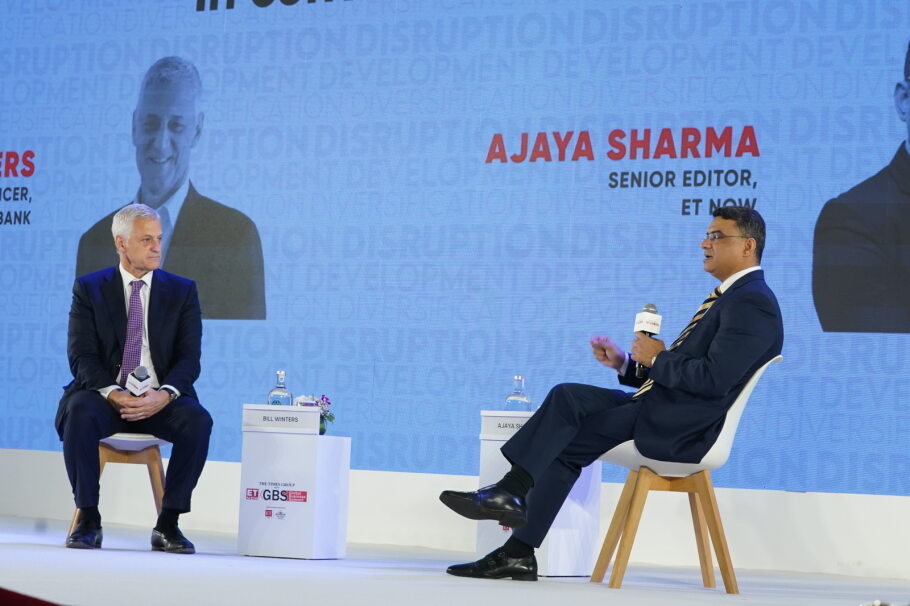Dynamic business flow: Both inbound and outbound investments paint a picture of vibrant economic activity

In the ET Now Global Business Summit 2024, which explored the theme of “Banking Beyond Borders: Risk, Resilience, and Recovery,” took place on February 9th and 10th in New Delhi, India. This session aimed to address the evolving landscape of the banking and finance sectors amidst significant structural and macroeconomic shifts.
The session featured a dialogue between Bill Winters, Chief Executive Officer of Standard Chartered Bank, and Ajaya Sharma, Senior Editor at ET NOW. Together, they explored the complexities of managing risks across diverse markets, building resilience in the face of economic uncertainties, and devising recovery strategies amidst geopolitical shifts and unforeseen disruptions.
In recent years, the banking and finance industries had been compelled to reinvent themselves to adapt to the changing global landscape. In the midst of global uncertainties, Bill Winters, Chief Executive Officer of Standard Chartered Bank, recently provided a thought-provoking perspective on India’s economic resilience and growth prospects.
He said, “India stands out with remarkable resilience. Unlike many other parts of the world, it is not only holding steady but also showing signs of growth. Comparatively, both the US and India, the two largest economies, are managing reasonably well. The fact that India is the fastest-growing economy speaks volumes about its fundamentally bullish prospects.”
Comparing the economic trajectories of the two largest economies, the U.S. and India, Winters emphasized India’s fundamentally bullish prospects. “Comparatively, both the US and India, the two largest economies, are managing reasonably well. The fact that India is the fastest-growing economy speaks volumes about its fundamentally bullish prospects,” He said.
Delving into the complex landscape of China, Winters expressed concerns about potential bubbles and emphasized the need for vigilance and said, “China is much more complex. Bankers are adept at spotting risk indicators, and in the case of China, there are indeed notable concerns. While there have been instances of small bubbles forming, particularly in the Chinese market, the main risk lies in the potential for these bubbles to burst.
The Chinese leadership has demonstrated an ability to navigate such challenges, effectively managing the fallout when bubbles do burst. However, it’s important to remain vigilant as these situations can still pose significant risks to the stability of the Chinese economy.”
Winters also pointed to the dynamic flow of businesses within and outside India, citing power and petrochemical sectors as particularly promising. In this session, Winters provided valuable insights into India’s economic landscape, showcasing both challenges and opportunities on the horizon.
Highlighting the dynamic flow of businesses within and outside the country, he said, “most thrilling aspect of India’s economic landscape is the significant flow of businesses, actively engaged in both outbound and inbound investment endeavors. Whether it’s within the power sector, petrochemicals, or other industries, the opportunities are vast and promising.”
Winters emphasized the strategic move of investing in companies poised for growth, with Indian banks standing out for their resilience and widespread presence across the nation. Acknowledging the wealth management sector’s steady development, “The wealth management sector in India is on a steady path of development. It’s crucial to construct a robust and diverse portfolio of foreign assets. However, it’s equally important for the capital generated to eventually circulate back into the Indian economy,” he stated.
Despite global uncertainties discussed within risk committee meetings, including geopolitical tensions and inflation rates, Winters expressed optimism, noting India’s remarkable resilience and its position as the fastest-growing economy. He stated, “Rest of the world is not booming like India. There is tremendous resilience. Two biggest economies: USA and India are doing okay. Fastest growing economy is fundamentally bullish.”
In contrast, he highlighted the complexity of China’s economic landscape, citing instances of small bubbles and the need for vigilant risk assessment.
Concluding by stating that India is relatively small economy, he said, “Financing companies that are invested in growth. Indian banks are tremendously strong. They have strong presence across the country. And all of them are incredibly strong. Wealth management industry continues to develop in India. (It is important to) to build a strong diverse portfolio of foreign assets. But that money should flow back into the Indian economy.”
This comprehensive perspective by Bill Winters captures both the challenges and immense potential within India’s evolving economic scenario.
As the global business landscape continued to evolve, discussions at the ET Now Global Business Summit 2024 provided valuable insights into navigating the challenges and opportunities facing the banking and finance sectors. By fostering dialogue among industry leaders and experts, the summit aimed to facilitate strategic collaborations and drive forward-thinking initiatives to ensure the long-term stability and sustainability of the global financial ecosystem.





